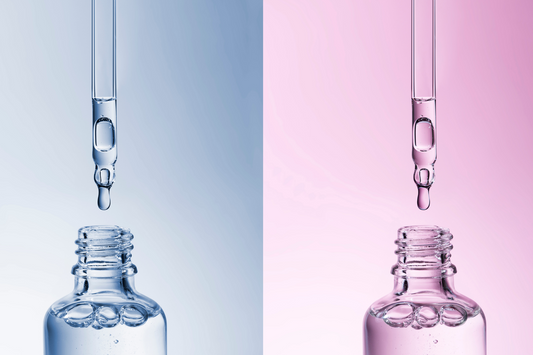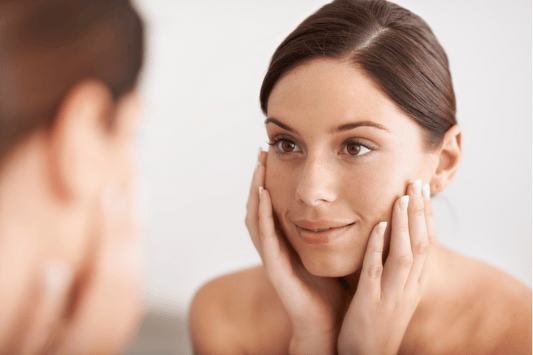Hair loss is normal.
In fact, according to the American Academy of Dermatology, it’s typical to lose between 50 to 100 strands of hair per day. That might seem like a lot, but considering that you have over 100,000 strands of hair on your head, it may not be immediately noticeable.
If you lose more than this amount each day—or if you’re starting to notice obvious signs of hair loss—it’s possible that your hair may be thinning. Thinning hair doesn’t always mean you’re on the way to baldness, but it can cause sparse areas on the scalp.
Thinning hair can be frustrating. Thankfully, effective treatments like Revela’s Hair Revival Serum can help.
What Causes Thinning Hair?
Thinning hair can be caused by a variety of different factors, including genetics, lifestyle choices, and certain medical conditions. Lifestyle habits that can contribute to hair loss include:
- Using harsh hair care products. Avoid using hair products that contain alcohols, including hairspray and gel.
- Tight hairstyles. Tight ponytails, buns, and braids place extra strain and tension on the hair strands, follicles, and scalp, which can result in a type of hair thinning known as traction alopecia.
- Overprocessing. This can include perms, coloring the hair or getting highlights, and using relaxers.
- Applying heat. Frequently using heated styling tools at high temperatures can cause hair to become brittle and dry.
- Stress. Chronic stress can release hormones like cortisol into the bloodstream which can contribute to setbacks in hair growth.
- Vitamin and mineral deficiencies. Balanced levels of essential nutrients can contribute to healthy hair growth, while deficiencies may lead to thinning.
Certain medical conditions and life events may cause hair thinning. Some conditions include:
- Thyroid disorders
- Hormonal changes
- Recently giving birth
- Sudden weight loss
- Autoimmune disorders
- Skin disorders
- Behavioral disorders, like trichotillomania, bulimia nervosa, or anorexia nervosa
- Nutritional deficiencies, particularly iron and vitamin D
Will My Hair Grow Back?
If your hair is thinning, there’s good news: It does grow back in most cases.
However, some situations—like those caused by certain medical conditions—may make it more difficult to regrow your hair. One such condition, cicatricial alopecia, can cause inflammation and scarring that tends to permanently damage and destroy the hair follicles.
The underlying cause of your hair loss will often determine whether or not it’s possible to regrow your thinning hair, so let’s review some of the more common issues.
Genetic Hair Loss
Androgenetic, or pattern, alopecia can occur in both men and women alike.
In the case of androgenetic alopecia, hair follicles shrink and stop producing hair as a result of hormones known as androgens like DHT. In women, thinning tends to occur at the crown of the head, while in men, it starts at the hairline above the forehead and starts to spread from front to back.
Left untreated, men can experience baldness, while women tend to experience more moderate hair thinning. A certified dermatologist can help to diagnose your condition by evaluating your scalp before determining what treatment options may be available to treat any presentations of androgenetic alopecia.
Alopecia Areata
Alopecia areata—specifically, alopecia focalis, but commonly referred to as alopecia areata—is characterized by sudden hair loss in small patches on the scalp. While the exact cause of onset is often unclear, research has suggested that both stress and genetic factors may be the primary triggers behind alopecia areata.
As hair can often regrow on its own within a few months after experiencing alopecia areata, most people don’t require treatment for acute cases.
Hormonal Imbalances
In women, life events like the onset of menopause, a pregnancy or childbirth can all affect hormone levels and potentially cause hair thinning. Hormonal medications like birth control can contribute to these imbalances and thinning, as well. Men can also experience hair loss due to temporary hormonal fluctuations, but these presentations of hair loss due to hormonal imbalances tend to be short-lived.
In both men and women, however, thyroid disorders can exacerbate any preexisting hormonal imbalances and serve as a significant contributing factor to any hair loss.
Nutrient Deficiencies
Hair growth is caused by numerous factors, but a nutrient deficiency can certainly contribute to hair loss and accelerate the hair loss from conditions like androgenetic alopecia, alopecia areata, and chronic telogen effluvium.
Particular deficiencies to watch out for include low dietary iron, vitamin D, biotin, selenium, zinc, and vitamin A. Studies have also indicated that low levels of folic acid and fatty acids, like omega-3s, can also impact the health of your hair. It’s also important to stay properly hydrated, as well!
Stress
Chronic stress can significantly impact your overall health, and it can play a large role in any hair loss you may be experiencing. Keep track of your mood and stress, and if necessary, add some stress-relieving activities to your daily routine. These can include:
- Yoga
- Meditation
- Enjoyable hobbies
- Sufficient rest
Medications
Certain medications are known to cause hair loss as a side effect. If you’re uncertain about your medications and the impact they may have on your hair, talk to your doctor or dermatologist if you suspect that your medication is causing unwanted hair loss.
What Are Some Home Remedies for Hair Growth?
Experiencing hair loss and want to try to remedy it at home? The following options might be for you.
Scalp Serum
At Revela, our Hair Revival Serum is a topical solution designed for those experiencing hair thinning or loss. It helps to revive hair follicles and give your roots a fresh start. Hair Revival Serum supports healthy follicles without the use of harsh chemicals like minoxidil—instead, our proprietary ingredient, ProCelinyl™, is supported by soothing aloe vera, caffeine, niacin, and biotin as it targets dormant hair follicles.
Scalp Massage
A daily scalp massage while you shampoo or apply a scalp serum can help to support blood flow to both the scalp and the individual hair follicles. That improved circulation may encourage faster hair growth by getting more nutrients to your roots while carrying away more excess waste from your tissues.
If that sounds appealing, check out our silicone Scalp Massager—it makes it easy to work in topical serums and oils and encourage healthy circulation in the scalp at the same time!
Supplements
If you’re experiencing a deficiency, multivitamins can help bring your body back into balance. Healthy levels of key nutrients are essential when it comes to encouraging healthy hair growth and staving off hair loss.
We’ve blogged about it before, but certain nutrients—particularly iron, zinc, vitamin D, selenium, and collagen, to name a few—work overtime to support both your hair and your overall well-being.
B vitamins
The eight B vitamins are crucial for wellness and hair health.
Biotin, aka vitamin B7, is a water-soluble form of vitamin B that’s found primarily in foods rich in protein like nuts, meat, and lentils. Though most people get enough biotin through their daily diet, it’s possible that biotin supplements or topical treatments containing biotin may help promote hair health.
Fatty Acids
Polyunsaturated fatty acids (PUFAs) like omega-3 and omega-6 are known to be helpful in combating health issues like coronary heart disease, but they may have benefits when it comes to the health of the scalp and skin.
Because our bodies can’t make these types of fatty acids on their own, we’re forced to get them through our food—depending on your situation, it could be important to adjust your diet to get more omega-3 and omega-6 fatty acids, or it may be beneficial to consider taking a dietary supplement. If you’re looking for foods rich in omega-3 and omega-6, stock up on poultry, eggs, fish (like salmon, mackerel, tuna, and cod), and seeds.
Laser Therapy
For the longest time, laser therapy treatments had been conducted solely at the dermatologist’s office; however, at-home laser treatments to treat hair loss have recently been given the green light by the FDA.
Though these treatments can help to regrow hair and make it appear thicker, the necessary equipment can be costly and it may take months to see results, if at all. If you’re considering investing in an at-home laser therapy device, make sure to consult with your doctor to find one that works without breaking your budget.
Bottom Line
Hair thinning is a common issue and we know it can be disheartening to experience hair loss at any age.
At Revela, we understand the struggles of millions of women across the US (and billions worldwide) and we’ve got your back. Our Hair Revival Serum works to revitalize your hair follicles and awaken your roots. We discovered, tested, and patented our key ingredient, ProCelinyl™—you won’t find it anywhere else—and we’ve loaded up our serum with soothing yet invigorating ingredients and botanicals like aloe vera and caffeine, and B vitamins like biotin and niacin. It’s the one-stop hair loss regimen you’ve been looking for!





